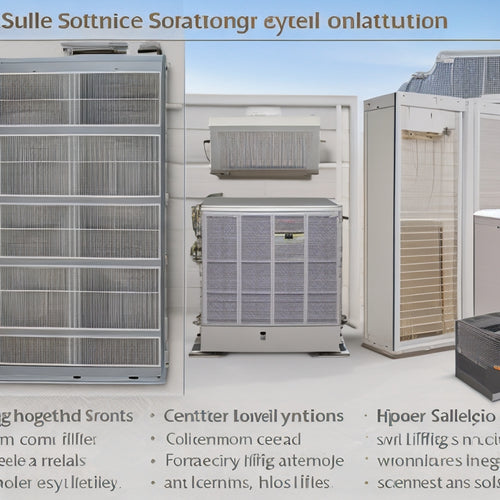
What Inverters Support High-Capacity EV Charging Stations?
Share
When selecting inverters for high-capacity EV charging stations, you'll need high-power DC-AC inverters from top brands like Siemens, SMA, and ABB. These inverters must handle surge capacity and rapid charging cycles while guaranteeing reliable and efficient energy distribution. Look for inverters with proven reliability and performance, high-power ratings, and solar inverter efficiency. DC-coupled inverter solutions can also streamline charging processes. To guarantee seamless charging experiences, you'll need to take into account peak power output, grid connection capacity, and energy distribution management. Now, discover how to optimize your high-capacity EV charging station with the right inverter selection.
Key Takeaways
• Top grid-tie inverter brands like SMA, ABB, and Schneider Electric offer reliable high-power inverters for high-capacity EV charging stations.
• High-power inverters with high surge capacity and rapid charging cycle handling capabilities are essential for efficient energy distribution.
• Solar inverter efficiency ratings above 98% ensure optimal energy harvesting for EV charging stations, reducing strain on the electrical infrastructure.
• DC-coupled inverter solutions streamline the charging process, increasing the overall efficiency of high-capacity EV charging stations.
• Selecting inverters with advanced grid support features ensures a seamless and efficient charging experience while promoting grid resilience.
Top Grid-Tie Inverter Brands
When selecting an inverter for your high-capacity EV charging station, you'll want to explore top grid-tie inverter brands that offer high efficiency, reliability, and scalability.
Inverter reliability is essential, as it directly impacts the performance and lifespan of your charging station. You'll want brands that boast a proven track record of delivering high-quality, reliable products.
Brand loyalty also plays a significant role, as it often translates to better customer support, warranties, and maintenance services. Look for brands with a strong reputation for delivering high-performance inverters that can handle the demands of high-capacity EV charging.
High-Power Inverter Requirements
To guarantee seamless operation and maximum efficiency, your high-capacity EV charging station demands an inverter capable of handling high-power output, high surge capacity, and rapid charging cycles.
You need an inverter that can deliver high power density to guarantee fast and efficient charging. This requires advanced heat management systems to prevent overheating and maintain peak performance.
Look for inverters with high-power semiconductor devices, advanced thermal management systems, and efficient cooling mechanisms to secure reliable operation.
Solar Inverter Efficiency Ratings
When selecting a solar inverter for your high-capacity EV charging station, you'll want to take into account the efficiency ratings, which are crucial for optimizing energy harvesting.
You'll notice that inverters have peak power tracking capabilities, ensuring maximum power output during ideal sunlight conditions.
Peak Power Tracking
Your solar inverter's peak power tracking capability greatly impacts its efficiency rating, as it directly affects how much DC power is converted into usable AC power.
By optimizing power output, you can maximize energy harvesting and reduce losses. Peak power tracking involves monitoring the solar panel's maximum power point (MPP) to guarantee the inverter extracts the most energy possible.
This is essential for high-capacity EV charging stations, where every kilowatt-hour counts. To achieve peak performance, look for inverters with advanced peak power tracking algorithms that can adapt to changing environmental conditions.
This ensures you're harnessing the maximum amount of energy from your solar array, resulting in increased power optimization and a more efficient charging station.
Maximum Efficiency Zones
By choosing an inverter with high maximum efficiency zones, you can guarantee that your high-capacity EV charging station operates within peak energy harvesting ranges, minimizing energy losses and maximizing the overall efficiency of your solar array. Maximum efficiency zones refer to the inverter's ability to optimize energy harvesting across a range of input voltages and temperatures.
Look for inverters with high maximum power point tracking (MPPT) efficiencies, typically above 99%, to secure peak performance. This secures that your solar array operates at its maximum potential, translating to more energy harvested and reduced losses.
DC-Coupled Inverter Solutions
DC-coupled inverter solutions, featuring direct current (DC) power conversion, enable fast and efficient charging of electric vehicles, allowing you to take advantage of the full potential of high-capacity EV charging stations. These solutions streamline the charging process, reducing energy losses and increasing overall efficiency.
By leveraging a DC architecture, you can:
- Simplify your charging infrastructure
- Reduce the need for multiple power conversion stages
- Increase energy harvesting capabilities
- Minimize energy losses during charging
- Optimize your charging station's performance and reliability
With DC-coupled inverter solutions, you can maximize the full potential of your high-capacity EV charging stations, ensuring a faster, more efficient, and more reliable charging experience.
High-Capacity Charging Station Needs
When designing high-capacity EV charging stations, it's crucial to consider the specific requirements of your charging infrastructure. This includes factors such as the maximum power output, charging speed, and electrical infrastructure demands. You need to guarantee that your station design can handle the energy demands of multiple vehicles charging simultaneously.
This means taking into account factors like peak power output, grid connection capacity, and electrical distribution. A well-designed station will be able to efficiently manage energy distribution, minimizing downtime and maximizing charging capacity.
Inverter Compatibility and Safety
You must carefully select an inverter that not only matches your station's power output requirements but also guarantees safe and reliable operation, complying with relevant electrical safety standards and regulations.
Inverter compatibility and safety are important aspects to take into account when setting up a high-capacity EV charging station. Here are some key factors to ensure inverter compatibility and safety:
-
Look for inverters with certifications like UL (Underwriters Laboratories) or ETL (Intertek), which ensure compliance with electrical safety standards.
-
Conduct regular electrical inspections to identify potential hazards and ensure the inverter is installed correctly.
-
Verify the inverter's power output matches your station's requirements to prevent overheating or electrical shock.
-
Check the inverter's compatibility with your station's electrical infrastructure.
-
Ensure the inverter is designed for outdoor or indoor use, depending on your station's environment.
Commercial Scale Inverter Options
Selecting a commercial-scale inverter that can efficiently handle high-capacity charging demands is critical to ensuring uninterrupted operation and minimizing downtime at your EV charging station. When it comes to commercial applications, large infrastructure projects require inverters that can handle high power output and multiple charging points. Here are some commercial-scale inverter options worth exploring:
| Inverter Model | Power Output | Charging Points |
|---|---|---|
| ABB Ability | up to 1.2 MW | up to 24 |
| Siemens Sivacon | up to 2.4 MW | up to 48 |
| Schneider EVlink | up to 1.5 MW | up to 36 |
These commercial-scale inverters are designed to support large infrastructure projects, providing reliable and efficient power conversion for high-capacity EV charging stations.
Future of Solar EV Charging
As you explore the future of solar EV charging, you'll discover the potential of solar-powered charging infrastructure to revolutionize the way we fuel our vehicles.
By integrating renewable energy sources into EV charging systems, you can reduce reliance on the grid and create a more sustainable transportation network.
With grid-resilient charging systems, you'll be able to optimize energy distribution and guarantee a seamless charging experience.
Solar-Powered Charging Infrastructure
Solar-powered charging infrastructure is poised to revolutionize the electric vehicle (EV) industry by providing a clean, sustainable, and renewable energy source that can support high-capacity EV charging stations.
As you explore the potential of solar-powered charging, you'll discover a range of benefits that can transform the way we think about EV charging. For instance:
-
Energy Storage systems can be integrated with solar panels to guarantee a reliable power supply, even during periods of low sunlight.
-
Green Cities can be created by incorporating solar-powered charging infrastructure, reducing greenhouse gas emissions and promoting sustainable urban development.
-
Solar-powered charging stations can be designed to offer fast and efficient charging, reducing wait times and increasing driver satisfaction.
-
The use of solar power can lessen reliance on the grid, decreasing strain on the electrical infrastructure and promoting energy independence.
-
Solar-powered charging infrastructure can be easily scaled up or down, making it an ideal solution for both urban and rural areas.
Renewable Energy Sources Integration
By integrating multiple renewable energy sources, such as wind, hydro, and geothermal power, with solar energy, you can create a resilient and diversified energy mix that establishes a reliable and efficient supply of electricity for high-capacity EV charging stations.
This integration enables you to optimize energy generation and reduce dependence on fossil fuels, ultimately achieving carbon neutrality.
Energy storage systems can be used to stabilize the grid and guarantee a stable power supply, even when the sun isn't shining or the wind isn't blowing.
By combining these renewable energy sources, you can create a robust and sustainable energy infrastructure that supports the widespread adoption of electric vehicles.
This future-proof approach guarantees that your high-capacity EV charging stations are powered by clean energy, reducing your carbon footprint and supporting a greener tomorrow.
Grid-Resilient Charging Systems
You can guarantee a seamless charging experience at your high-capacity EV charging stations by implementing grid-resilient charging systems that can intelligently manage energy distribution, even when the grid is stressed or during periods of high demand. This approach secures Grid Reliability and prevents brownouts or blackouts.
By integrating Energy Storage solutions, you can optimize energy usage and reduce strain on the grid.
Here are some key benefits of grid-resilient charging systems:
-
Peak shaving: Reduce energy consumption during peak hours to prevent grid overload
-
Load balancing: Distribute energy evenly to prevent hotspots and reduce strain on the grid
-
Renewable energy integration: Seamlessly integrate solar or wind power into your charging infrastructure
-
Energy storage optimization: Maximize the efficiency of your energy storage systems
-
Real-time monitoring: Get real-time insights into energy usage and grid performance
Frequently Asked Questions
Can Residential Inverters Support High-Capacity EV Charging Stations?
As you navigate the world of EV charging, you'll find that residential inverters, like a skilled conductor, orchestrate Home Integration and Power Optimization, but are not designed to support high-capacity stations, leaving you to seek heavier-duty solutions.
Are High-Power Inverters Compatible With Existing Electrical Infrastructure?
You'll need to assess whether high-power inverters can handle the electrical load without overloading the grid, as infrastructure constraints may necessitate grid upgrades to guarantee reliable and efficient charging operations.
What Certifications Are Required for Inverters in High-Capacity Charging Stations?
As you navigate the high-stakes world of EV charging, remember that certifications are the keys to accessing safety and reliability. You'll need UL compliance, adhering to stringent safety standards, to guarantee your inverter is trustworthy and efficient.
Can Dc-Coupled Inverters Be Used for Both Solar and Energy Storage?
You can utilize DC-coupled inverters for both solar and energy storage, leveraging DC coupling to optimize energy harvesting and reduce losses, thereby enhancing overall energy optimization and control in your high-capacity EV charging station.
How Do Inverters Handle Surge Capacity During Peak Charging Hours?
When you're dealing with high-capacity EV charging, you need inverters that can handle power surges during peak hours, ensuring the Power Grid isn't overwhelmed by electrical spikes, and maintaining a stable, controlled charging process.
Related Posts
-

Why Solar HVAC Filters Revolutionize Home Energy Efficiency
By adopting solar HVAC filters, you're shifting your home's energy reliance from fossil fuels to clean, renewable sou...
-

What Are Natural Clay Paints for Green Home Interiors?
You're about to uncover a game-changing alternative to synthetic paints that not only enhances the aesthetic of your ...
-

Transform Your Outdoor Space With Recycled Plastic Lumber
By incorporating recycled plastic lumber into your outdoor design, you're not just building a deck or installing a fe...


